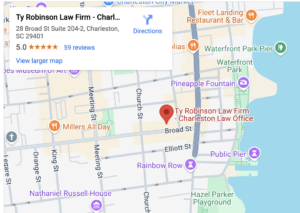Ty Robinson | April 28, 2025 | Personal Injury

Personal injury claims vary widely, from a few thousand dollars for a soft tissue injury, to millions of dollars for severe burns. Any average figure is virtually meaningless in the same way that it is just about meaningless to talk about the average salary across all jobs.
Nonetheless, there are some common factors that apply to most cases that can give you insight into how much your claim might be worth. Continue reading for more information, and contact a personal injury lawyer in Charleston for a free case review if you need help.
Elements of Personal Injury Damages
Personal injury damages can include economic damages, non-economic damages, and punitive damages.
Economic Damages
If you can easily count a loss, it probably represents at least a part of your economic damages. Following are some examples.
Medical expenses
Medical expenses include any reasonable and necessary medical bills that arise from your injury. Be aware that the insurance company might question unconventional medical treatments such as chiropractic care or acupuncture. They might also question conventional medical treatments.
Lost earnings
If you are employed for a set wage or salary, calculating your lost earnings should be a simple matter. Just remember to count each sick leave or vacation leave day you took as a full day’s loss of pay. If you are self-employed or you work on commission, calculating your lost earnings could get more difficult.
Diminished earning capacity
Diminished earning capacity is the amount by which your lifetime income suffered on account of your accident. This subcomponent of damages becomes very important when you suffer long-term or permanent injury.
Out-of-pocket expenses
You might need to pay insurance deductibles and copays, OTC medication, a wheelchair, child care, and similar items out of your own pocket.
Non-Economic Damages
Non-economic damages compensate you for intangible losses that are difficult to count, such as the items that appear below.
Pain and suffering
“Pain and suffering” refers to physical and mental suffering, such as respiratory distress or the every-breath pain of a broken rib. In many (but not all) cases, the pain and suffering component of a personal injury claim is worth more than the entire rest of the claim combined.
Emotional distress
Fear, shock, and grief all count as emotional distress. You deserve compensation for any emotional distress that your accident caused you.
Loss of enjoyment of life
Do your injuries prevent you from participating in activities that once added enjoyment to your life, such as exercising or playing with your children? You can include these losses with your claim.
Disfigurement
Imagine you suffered burns and scarring on your face or over a significant percentage of your body. You deserve compensation for this, even if only for the social disadvantages your disfigurement generates.
Permanent disability
Suppose you lost your thumb in an accident, or lost the ability to walk.
Loss of consortium
A loss of consortium claim belongs to the spouse of the injured victim. It compensates the spouse for loss of companionship, affection, emotional support, sexual relations, and household services.
Punitive Damages
Punitive damages are an extra amount that a court occasionally awards the victim of outrageous behavior by the defendant. A court might grant punitive damages for a road rage incident, for example, or for a DUI accident.
Limitations on the Damages You Can Recover
Certain factors, some of which appear below, limit the amount you can recover for a personal injury settlement.
Caps on Non-Economic and Punitive Damages
South Carolina law limits the amount of money you can claim for non-economic damages in medical malpractice cases. There are also limits on punitive damages awards (with exceptions to those limits).
Deductions From Your Settlement
Your attorney will deduct the following amount from your gross settlement, to the extent that they apply:
Attorney’s fees
Personal injury lawyers typically work on a contingency fee arrangement, meaning nothing in attorney’s fees if you lose, but 30% to 40% of your damages if you win.
Case expenses
Your lawyer will subtract case expenses (expert witness fees, for example) from your final settlement.
Medical liens
Your lawyer will subtract any medical lien for which your settlement serves as collateral. A medical lien secures payment of your medical bills while your personal injury claim is pending.
Talk to a South Carolina Personal Injury Lawyer
The internet cannot tell you how much your personal injury claim is worth. A personal injury lawyer might be able to give you a ballpark estimate, however, after learning a few factors about your claim.
The best way to seek an evaluation of your claim is to schedule an initial case consultation with an experienced South Carolina personal injury lawyer. Remember that any reputable personal injury lawyer won’t charge you attorney’s fees unless they win compensation for your claim.
Contact Our Charleston Personal Injury At Ty Robinson Personal Injury & Car Accident Law Firm Today
If you were injured in an accident in Charleston, South Carolina, and need legal help, contact our Charleston personal injury and car accident attorneys at Ty Robinson Personal Injury & Car Accident Law Firm to schedule a free case review today.
Ty Robinson Personal Injury & Car Accident Law Firm
28 Broad St Suite 204-2
Charleston, SC 29401
(843) 278-2222



